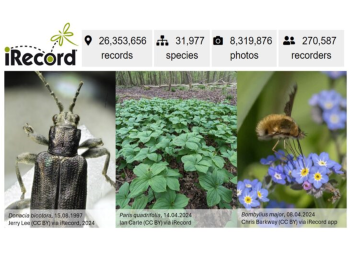During 2023 over 4 million records were added to iRecord and shared from the apps and websites that make use of the iRecord data warehouse, including over 2 million images.
Thanks to all who those who have contributed records, and especially to all the recording scheme verifiers who have given up their time and incredible expertise to ensure that high quality data can be shared with the NBN Atlas.
During 2023 alone, 668 verifiers (63 new) verified 2.5 million records!
We are constantly working to improve the functionality of iRecord, and we summarise some of the recent improvements below.
Verification tools
Increasing numbers of biological records are very welcome and valuable but can put a strain on the volunteer verifier community. We worked with Butterfly Conservation as part of the Supporting Science project to improve the functionality in the iRecord verification system to make their job easier. Thank-you to all the verifiers who were involved in the consultation process. Improvements implemented in 2023 include:
- Bulk verification functions are now available, including (via the “redet” button) for redeterminations. This is particularly useful in light of the increasing use of timed counts for butterflies (and potentially other taxa in future), where counts of a single species at one location over a period of time (e.g.15 minutes) may produce large numbers of separate records for each individual sighting of the same species within that time - see the guidance note for more information on the timed counts.
- Verifiers can now save one or more templates that can be used to quickly add standard text to a verification comment.
- A photo verification page enables verifiers to view much larger images than the usual grid, avoiding the need to select photos individually.
Notifications
Users submitting records to the iRecord and other websites linked to the BRC data warehouse can choose if and how often they receive notifications relating to their records via email, and recent improvements include:
- Handling of notifications has been improved with the aim of making queried records more obvious to the recorder.
- All notifications now give both English and scientific names.
- Notifications for training records have been removed.
Move to new servers
To plan for ongoing capacity increases and ensure performance keeps up with demand, last winter UKCEH completed a server move which included iRecord and other websites using the BRC data warehouse.
iRecord as a primary data repository for NSS
iRecord continues to present an attractive option for national schemes and societies (NSS) to hold all their data in one place, and the BRC have help on hand to import large quantities of historic data. Those who have recently consolidated their data holdings in the iRecord data warehouse include the Ground Beetle Recording Scheme, the Soldierflies and Allies Recording Scheme, and the UK Ladybird Survey, with others, such as the British Plant Gall Society, to follow.
New species group recording forms in iRecord
There are a number of species-group recording forms on the iRecord website (available via the Record menu) which have been developed in collaboration with national schemes and societies. Examples include, Dragonflies (single or multiple species), Moths, Vascular plants (grid recording), and updates have also been made to the Sawflies and Bryophytes forms.
Earlier this year we worked with the Spider Recording Scheme (SRS) to create a new recording form for spiders, harvestmen and pseudoscorpions. This includes a number of additional data fields that allow the SRS to continue capturing detailed information on habitat associations and recording methods. The form can be found under the “Explore” menu on the iRecord website – go to “Species group forms” and choose “spiders, harvestmen, pseudoscorpions”, or go direct to this link.
A new Centipedes, millipedes and woodlice form is currently in development with the British Myriapod and Isopod Group (BMIG).
iRecord is maintained and developed by the UKCEH Biological Records Centre (BRC). iRecord and the related Indicia systems provide online tools to collate records for checking and sharing.
